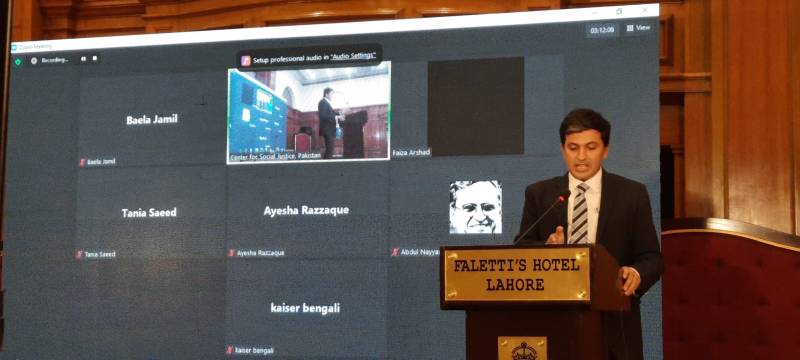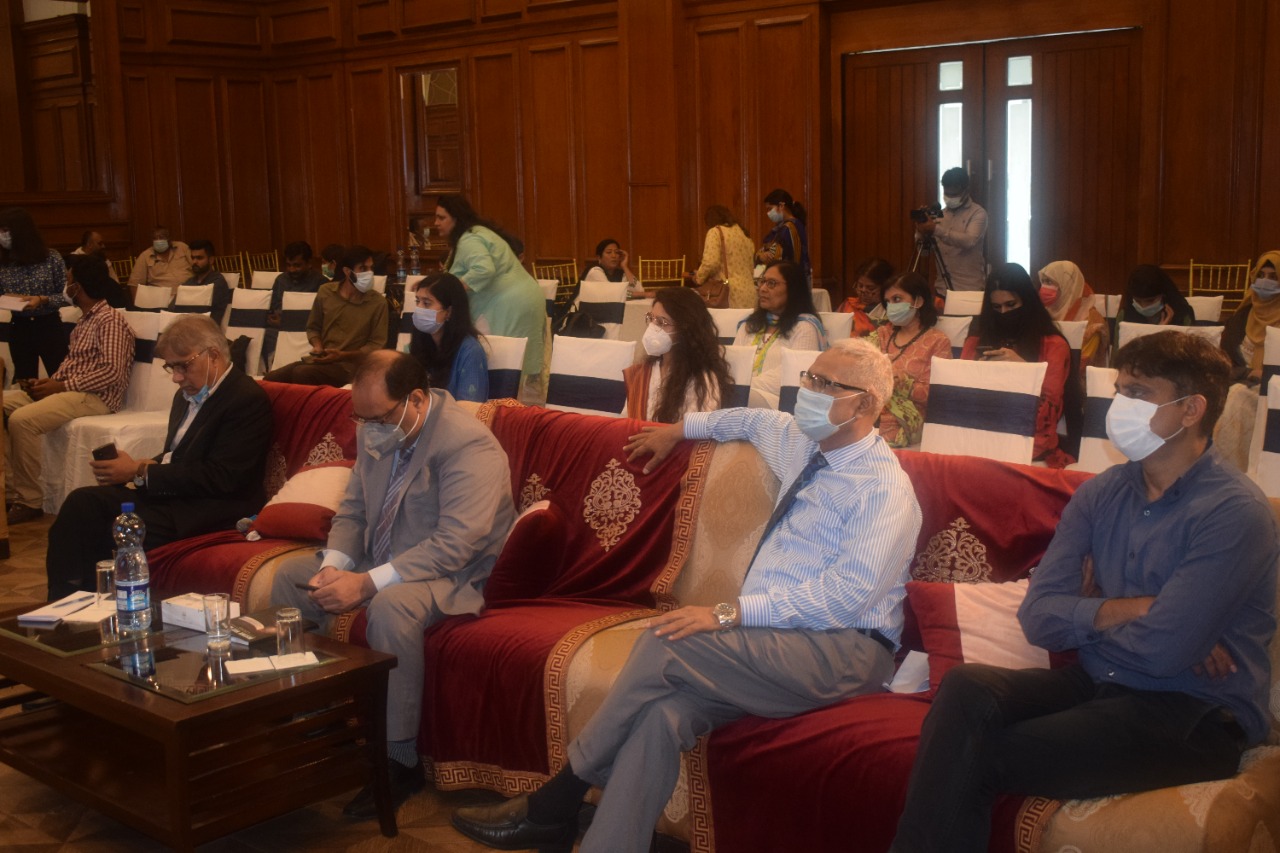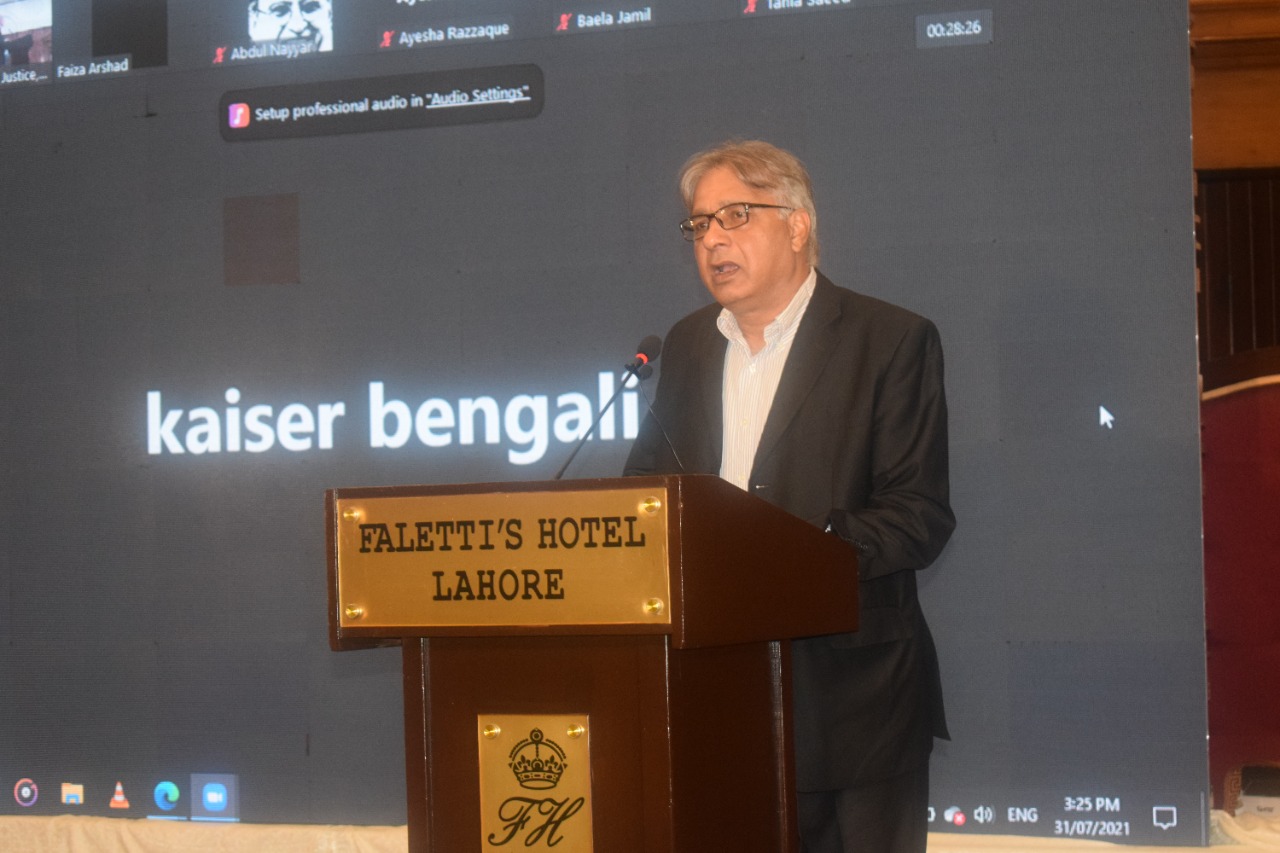
To take forward the mission of Ibne Abdur Rehman, the authorities need to realign themselves and engage all stakeholders for curriculum reforms, promotion of religiously inclusive education and human rights. These views were expressed by senior educationists while paying homage to the titan of Human Rights IA Rehman at the ilm conference organized under the aegis of the Centre for Social Justice. The discussion was called to facilitate exchange of views between policy experts and educationists on the Implementation of Article 25A of the constitution of Pakistan, Academic Framework and Single National Curriculum. The conference was attended by senior human rights activists, intellectuals, educationists, students in person and hundreds of participants online.
In the opening remarks, Peter Jacob, the Executive Director CSJ stated that the Article 25A of the Constitution of Pakistan establishes free and compulsory education as a fundamental human right, and since it’s passing under the 18th Amendment several steps have been taken by the federal and provincial governments to make it a reality. However, issues of out of school children, low enrollment, drop outs, lack of teachers’ training, limited budget allocations, violation of article 22(1) and absence of wide and inclusive consultations remains a core concern for stakeholders.
Dr Kaiser Bengali, An economist, researcher and policy expert, in his presentation on “Education in Pakistan: Context and Commitment” addressed two issues. One of the context of the effects and causes of education which highlights the relationship of education to certain key human development indicators: literacy, enrolment, immunization, reproductive health, etc. and identifies the relationship of education to the unequal economic power structure, represented by unequal land ownership, and attributes the poor outcomes to its lack of commitment to promoting equality. Two, how it reflects on the pretentious language of the numerous education plans and programs, with each one lamenting the failure of the previous plan or programme. The conclusion offered is to move away from asking the same power elites for better outcomes and struggle for an egalitarian power structure.
While discussing the policy direction in light of Article 25A, Dr Baela Raza Jamil, Educationist and Policy expert, elaborated that the NEP 2021 is an opportunity to frame education challenges through a dynamic lens and constitutional provision given in Article 25A. “It is vital to recognize that Education is a multi-sectoral activity which in its true essence and purpose grants right to education to all without any discrimination. The policy in making, must address out of school children with prior focus on the education of girls, children with disabilities, minorities and the poorest by providing them with quality content, pedagogies that combine academic and life skills with well-prepared and trained teachers. It must be backed by resources to ensure supply-side adequacy of facilities and procurement of service delivery to reach the most vulnerable” she added.
Dr A H Nayyar, renowned educationist and researcher, assessed the state of academic freedom in educational institutions of Pakistan. He pointed out that a true academic work is unthinkable without freedom to think and to express. “The powers that put curbs on academic freedom are in general deeply insecure from within, and fear challenges from honest academic work” he added.
Dr Ayesha Razzaque, a consultant and researcher, presented findings of her recent article “The constitutionality of SNC textbooks” which is based on a critical review of the PCTB SNC textbooks for the compulsory subjects of Urdu, English, General Knowledge, Social Studies, Science, and Math, for grade levels pre-primary to five. The objective of this review was to establish the constitutionality, (with regards to article 22(1) of the CoP 1973) of the new textbooks published by the PCTB. The analysis shows that the textbooks explicitly as well as implicitly infringe on the rights of children and teachers from faiths other than Islam as guaranteed by the constitution and the implementation of the textbooks in their current form will only perpetuate religious intolerance in the society damaging the well-being of children from both the majority as well as the minority faiths.
Dr Tania Saeed, Associate Professor LUMS, shed light on the right to education in relation to problems on the ground exploring questions of who has access to education, the kind of access, and who is left behind, while sharing narratives from local communities.
Saqib Jillani, renowned advocate, assessed the importance of legal framework on the Right to Education. He emphasized that Article 25A, is not a stand-alone right, it is part of Fundamental Rights specified in the Constitution. Therefore, it is vital to understand the importance of Right to Education by studying the underpinnings that connect this right to many other Fundamental Rights awarded including article 11, 19, 19a and article 22 of the constitution of Pakistan. He pointed out the importance and need for the federal and provincial education departments to comply with the rights guaranteed to all in the constitution as well as endorsed by the supreme court of Pakistan.
Participants urged the Government to consider the following demands/recommendations:
In the opening remarks, Peter Jacob, the Executive Director CSJ stated that the Article 25A of the Constitution of Pakistan establishes free and compulsory education as a fundamental human right, and since it’s passing under the 18th Amendment several steps have been taken by the federal and provincial governments to make it a reality. However, issues of out of school children, low enrollment, drop outs, lack of teachers’ training, limited budget allocations, violation of article 22(1) and absence of wide and inclusive consultations remains a core concern for stakeholders.

Dr Kaiser Bengali, An economist, researcher and policy expert, in his presentation on “Education in Pakistan: Context and Commitment” addressed two issues. One of the context of the effects and causes of education which highlights the relationship of education to certain key human development indicators: literacy, enrolment, immunization, reproductive health, etc. and identifies the relationship of education to the unequal economic power structure, represented by unequal land ownership, and attributes the poor outcomes to its lack of commitment to promoting equality. Two, how it reflects on the pretentious language of the numerous education plans and programs, with each one lamenting the failure of the previous plan or programme. The conclusion offered is to move away from asking the same power elites for better outcomes and struggle for an egalitarian power structure.

While discussing the policy direction in light of Article 25A, Dr Baela Raza Jamil, Educationist and Policy expert, elaborated that the NEP 2021 is an opportunity to frame education challenges through a dynamic lens and constitutional provision given in Article 25A. “It is vital to recognize that Education is a multi-sectoral activity which in its true essence and purpose grants right to education to all without any discrimination. The policy in making, must address out of school children with prior focus on the education of girls, children with disabilities, minorities and the poorest by providing them with quality content, pedagogies that combine academic and life skills with well-prepared and trained teachers. It must be backed by resources to ensure supply-side adequacy of facilities and procurement of service delivery to reach the most vulnerable” she added.
Dr A H Nayyar, renowned educationist and researcher, assessed the state of academic freedom in educational institutions of Pakistan. He pointed out that a true academic work is unthinkable without freedom to think and to express. “The powers that put curbs on academic freedom are in general deeply insecure from within, and fear challenges from honest academic work” he added.
Dr Ayesha Razzaque, a consultant and researcher, presented findings of her recent article “The constitutionality of SNC textbooks” which is based on a critical review of the PCTB SNC textbooks for the compulsory subjects of Urdu, English, General Knowledge, Social Studies, Science, and Math, for grade levels pre-primary to five. The objective of this review was to establish the constitutionality, (with regards to article 22(1) of the CoP 1973) of the new textbooks published by the PCTB. The analysis shows that the textbooks explicitly as well as implicitly infringe on the rights of children and teachers from faiths other than Islam as guaranteed by the constitution and the implementation of the textbooks in their current form will only perpetuate religious intolerance in the society damaging the well-being of children from both the majority as well as the minority faiths.
Dr Tania Saeed, Associate Professor LUMS, shed light on the right to education in relation to problems on the ground exploring questions of who has access to education, the kind of access, and who is left behind, while sharing narratives from local communities.
Saqib Jillani, renowned advocate, assessed the importance of legal framework on the Right to Education. He emphasized that Article 25A, is not a stand-alone right, it is part of Fundamental Rights specified in the Constitution. Therefore, it is vital to understand the importance of Right to Education by studying the underpinnings that connect this right to many other Fundamental Rights awarded including article 11, 19, 19a and article 22 of the constitution of Pakistan. He pointed out the importance and need for the federal and provincial education departments to comply with the rights guaranteed to all in the constitution as well as endorsed by the supreme court of Pakistan.
Participants urged the Government to consider the following demands/recommendations:
- Federal and provincial education ministries must devote all resources and potential to make primary education compulsory and available to all.
- Encourage the development of secondary education, including general and vocational education, make them available and accessible to every child, and launch incentive measures for the out of school children.
- Outline specific guidelines in National Education Policy for the provincial education departments, and textbook boards about avoiding discrimination on the basis of religion, gender, sect, language, ethnicity, etc. in all learning processes.
- Ensure academic freedom and make higher education accessible to all on the basis of capacity by every appropriate means.
- The curriculum and policy in pipeline should have a genuine plan with well-defined targets on policy action, completion timeline, estimated expenses, annual budgetary needs, and annual audit mechanism.
- Education boards should focus on teacher training programs incorporating elements of analysis, critical thinking, human rights, and social justice and cohesion, cultural and religious diversity.
- Take measures to encourage regular attendance at schools and the reduction of dropout rates.
